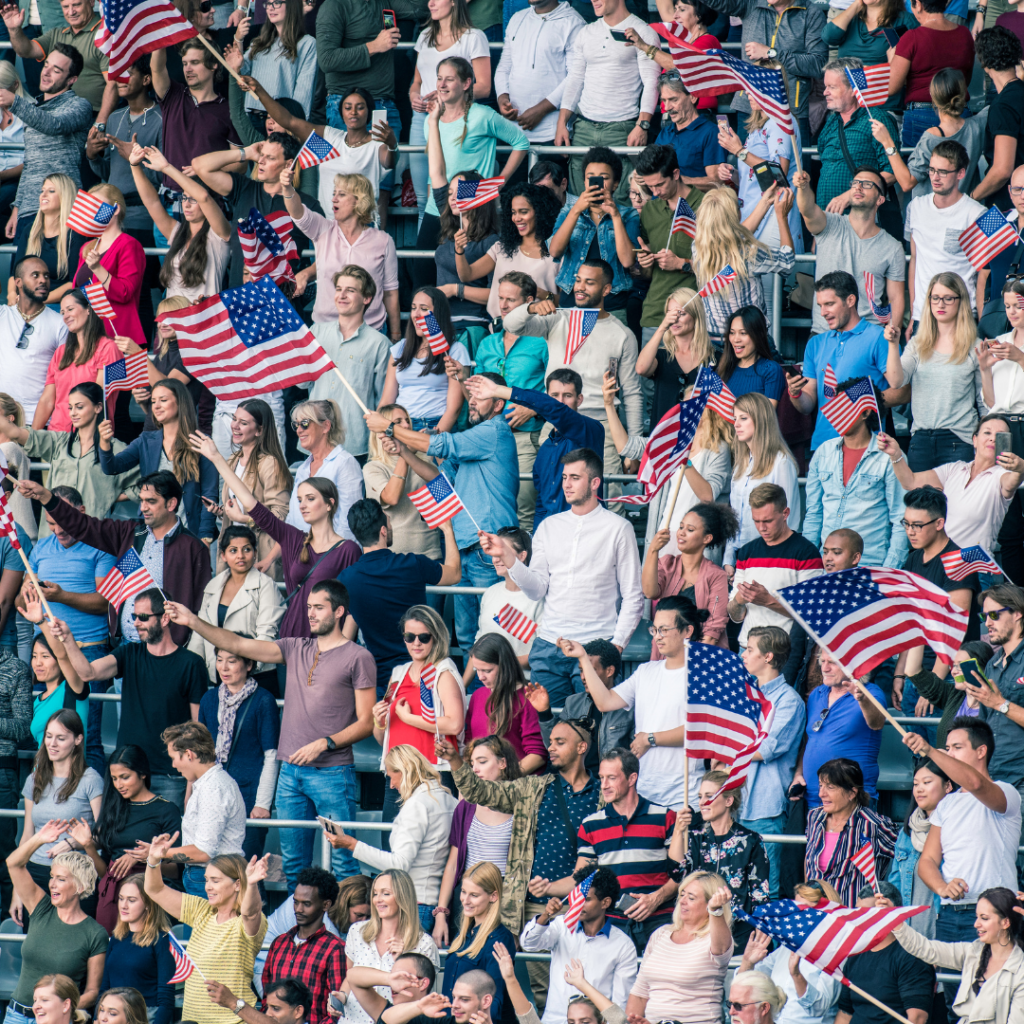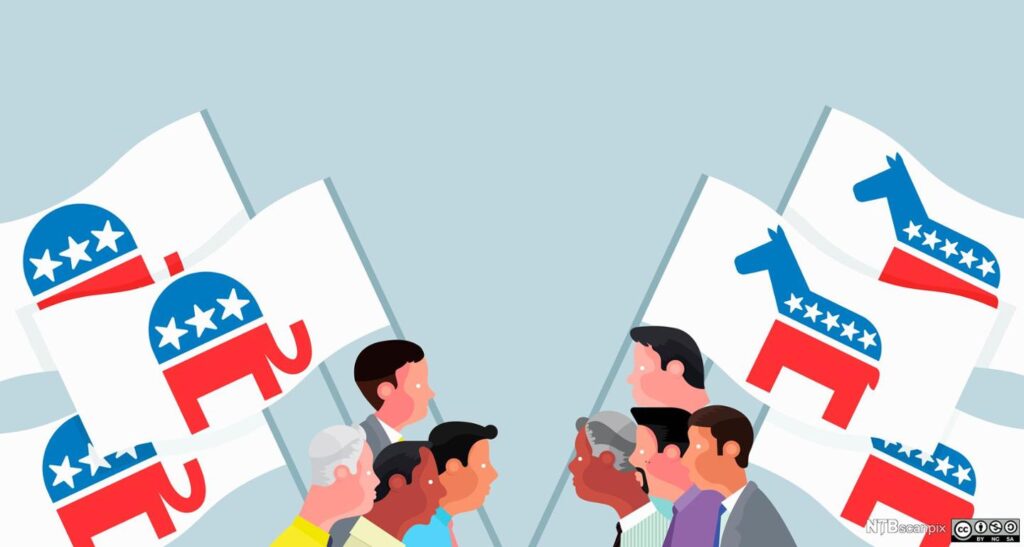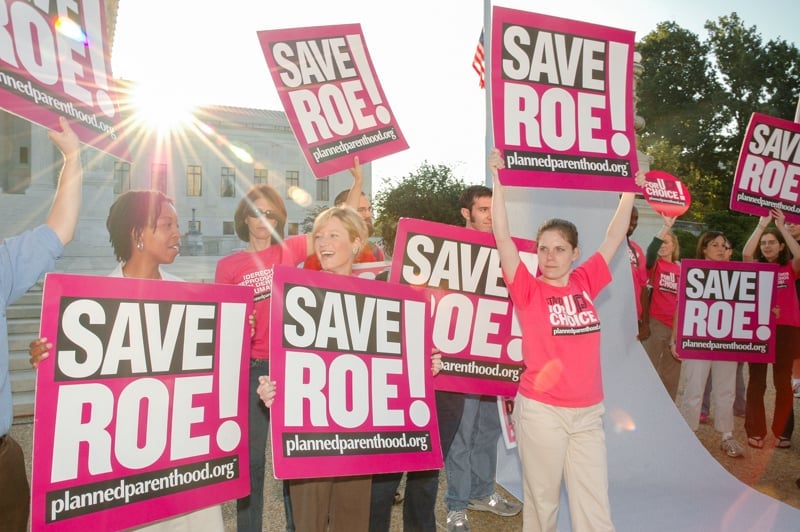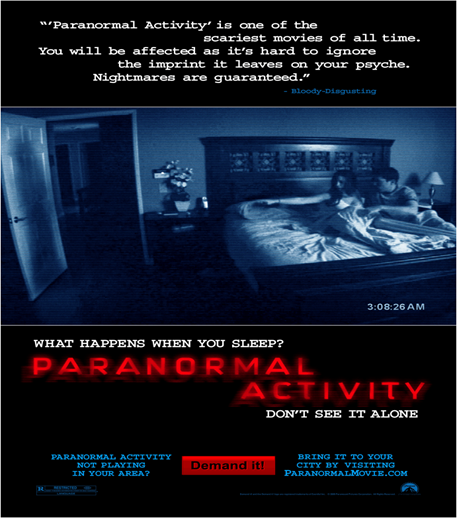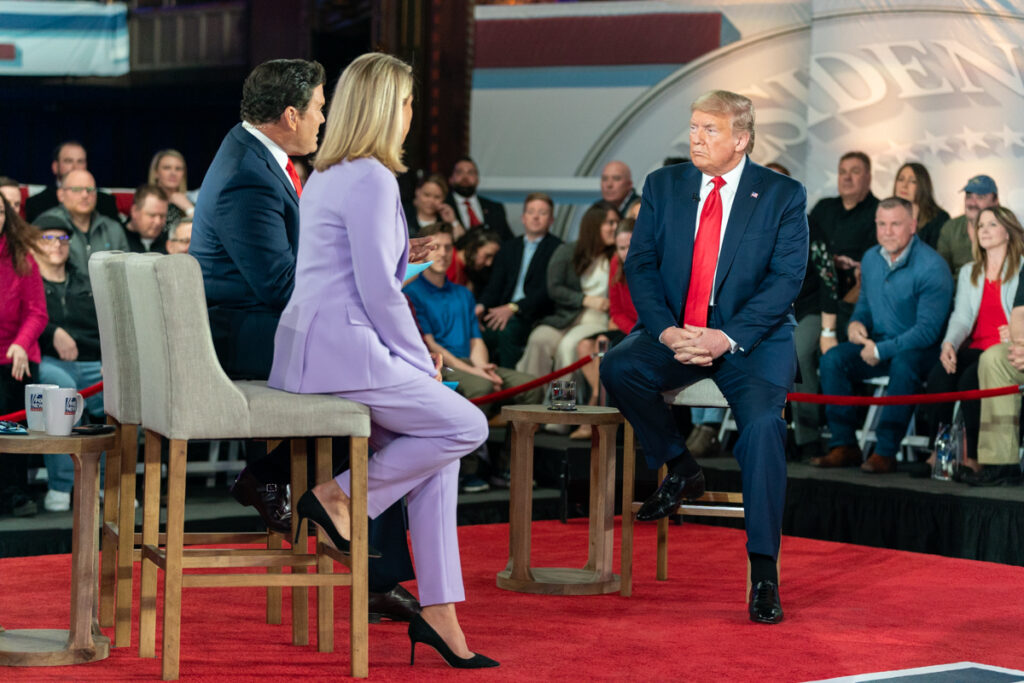On Monday, February 12th, the Kansas City Chiefs and the San Francisco 49ers will play in the 58th Super Bowl. For those unfamiliar with the event, it is the culmination of the NFL season, a fusion of sports, advertisement, and popular culture. Well over 100 million people will watch the broadcast at some point. Most will watch for the football, some for the commercials, and some for the Usher halftime show. Simply put, it is the biggest (by far) televised event in the United States every year, attracting more diverse eyes than any other program.
However, the reason I am taking the time to write to you has absolutely nothing to do with the Super Bowl. To be honest, I will start watching the game and I fully expect to be asleep on the couch before the conclusion of the first quarter. The reason I am writing to you is because of this:
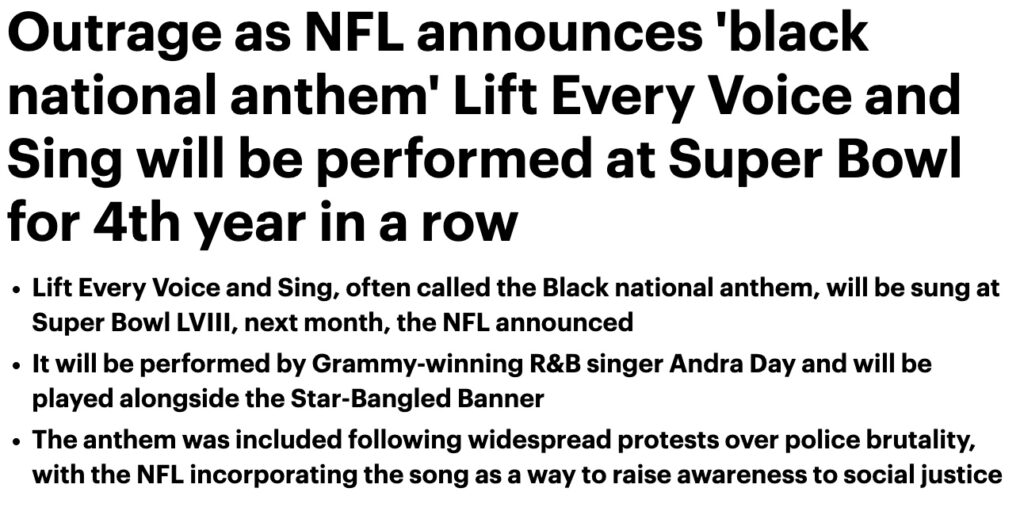
Now, I want to be clear about a couple of things before I continue. Am I outraged? Absolutely not. I have an 8-month-old son, so I have zero time to build any kind of outrage towards anything at the moment. Do I care which national anthem is performed at the Super Bowl? Not one bit. I am a fervent believer that patriotism should not be enforced, and I especially believe it shouldn’t be enforced or measured through singing along to a song. Do I believe that singing two national anthems is crazy? Yes, I do. To refer to the previous point, I do not care one bit what that anthem is or should be. I do not care what the lyrics are or the melody. Having said that, there should only be one, because, as the name implies, it is a national anthem.
“Lift Every Voice and Sing” was originally written as a poem by James Weldon Johnson in 1900 and set to music by his brother, John Rosamond Johnson, in 1905. Initially composed for a celebration of Abraham Lincoln’s birthday, the song was a way to express the struggles and hopes of African Americans, particularly in the era of Jim Crow laws and segregation.
It quickly gained popularity within the Black community for its powerful portrayal of the African American experience, merging themes of suffering, faith, and the quest for freedom and equality. It was adopted by the National Association for the Advancement of Colored People (NAACP) as its official song in 1919, under the leadership of Johnson, who was then serving as the NAACP’s Executive Secretary.
Over the years, it has become a symbol of pride and unity among African Americans, embodying the collective hope for social justice and equality. The song’s lyrics speak of the past hardships of slavery, the faith that sustained those who suffered, and the hopeful determination for a better, freer future. It is an anthem of resilience and hope, resonating with new generations, maintaining its status as a vital part of American history and culture.
Symbols of unity matter, and “Lift Every Voice and Sing” is exactly that. It is an enduring, unbreakable symbol of immense unity. But it is not the national anthem. Again, as I have established, if the U.S. wants to get rid of the old one and replace it with this, fine by me. At its current state, albeit fragile, the United States is one nation, and fragmenting things by race says that we are two nations. Honestly, what the U.S. needs now is less anthems and more of this:
Damnit, I miss that man.
Dr. Timothy Askew, professor of English and humanities at Clark Atlanta University, wrote a book on this exact topic titled “Good Trouble: A Historical & Cultural Analysis of the Song, ‘Lift Every Voice and Sing.’” In that book, he wrote, “To sing the ‘black national anthem’ suggests that black people are separatist and want to have their own nation. This means that everything Martin Luther King Jr. believed about being one nation gets thrown out the window.”
Bingo. All that advancement, all that societal evolution, all that growth? It kind of seems as if the U.S. is going backward. In 1954, the Supreme Court ruled (9-0) that racial segregation in schools violated the 14th Amendment of the Constitution. Now, I know what you might be wondering: what is the 14th Amendment? Well, the 14th Amendment grants citizenship to all persons born or naturalized in the U.S., including former slaves, and provides all citizens with equal protection under the laws. So, this was the Supreme Court saying, “You know all that separate but equal nonsense? We’re not going to do that anymore.” I mean, separate but equal would imply two nations, right? Both “equal” yet entirely separate.
Does that mean the situation is perfect? Nope. Does it mean we shouldn’t continue to strive for advancement? Also, nope. But what it did mean is that separating things and groups based on race is no longer the thing you do in the United States. And the rest is history, and everyone lived happily ever after, the e…
Separate but Equal, Again
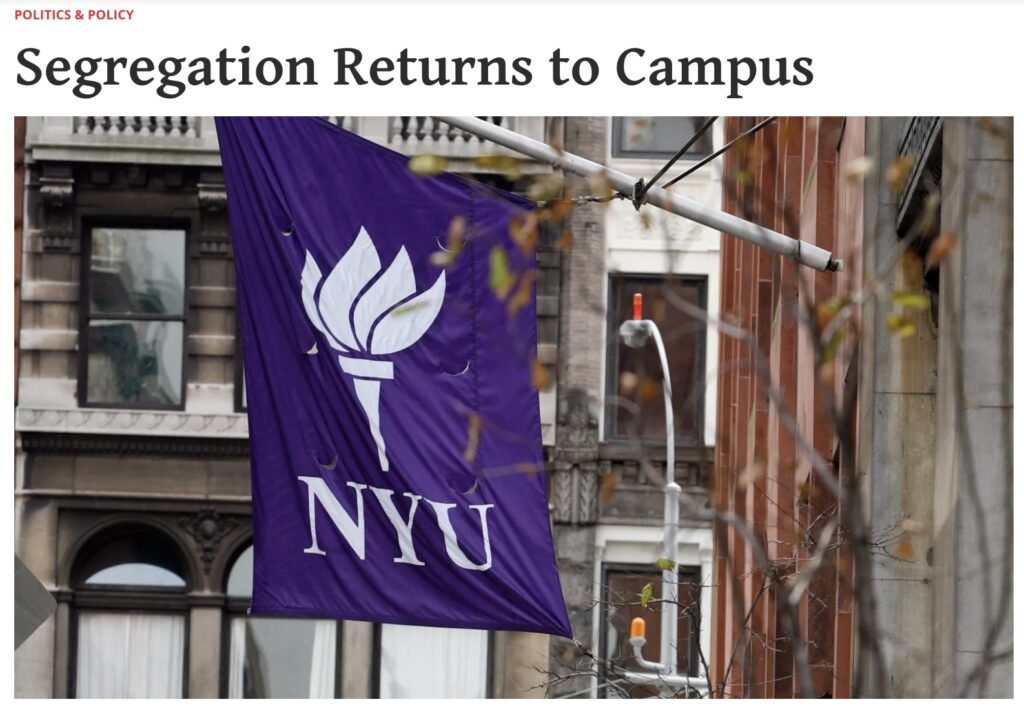
(Insert hand over face emoji)
In 2019, the National Association of Scholars (NAS) released a study titled “Separate but Equal, Again: Neo-Segregation in American Higher Education,” which examined 173 colleges and universities across all 50 states in the U.S. The investigation revealed that 43% of these institutions practiced residential segregation, 46% offered segregated orientation programs, and 72% conducted segregated graduation ceremonies. So, basically, parents are paying $100k a year to send their kids to Birmingham in the 1950s.
I am not going to try to define “woke” to anyone reading this article. For one, the definition seems to be both fluid and ubiquitous to the point where it has become a catch-all term encompassing a wide range of social and political concepts, used more for its emotional impact than for any precise meaning. And two, the term has been so politicized and used in various contexts that any single definition I provide might not fully capture its complexity or the diverse ways in which it is interpreted and applied in contemporary discourse.
My only question would be, can you become so woke that you actually go backward in your understanding and approach to social issues, inadvertently perpetuating the very biases and divisions you aim to dismantle? Short answer, I believe you can.
History is good for two things. One, if scheduled correctly in the day, it can be a great time to take a nap in high school. And two, it allows for a constant reminder of the lengths we have traveled to ensure that the dumb stuff we used to do doesn’t happen again. It isn’t until history is ignored that we find ourselves blindly navigating the ever-changing shores of society at the time. Meaning, whatever the perceived masses deem acceptable at the time, goes the direction of the power, regardless of the direction.
If one thinks that two anthems satisfy the outcry of the masses, then why not separate schools or separate neighborhoods. Oh wait! That’s called redlining. Redlining was (and to some extent still is) a discriminatory practice where certain communities, often predominantly Black and minority neighborhoods, were systematically denied services, particularly in housing and finance, leading to enduring socio-economic disparities. Disparities lasting generations. Disparities still felt by families to this day. But we grew. Society evolved and realized that such systemic inequalities are not only unjust but also detrimental to the collective progress and harmony of a nation. You see, we can’t have a melting pot if there are two pots. It does not work that way.
You know what happens to countries when they indulge separatist tendencies? They disintegrate. In Sarajevo, the Muslims and Catholics lived together for a century. Hell, they even hosted the Olympics. Then, nationalist fervor and separatist ideologies in the 1990s led to the tragic Bosnian War. The result? Devastating conflict, loss of lives, and a deep fracture in the societal fabric that once united diverse communities.
What about the Catholics and Protestants who lived in Ireland until deep-seated religious and political tensions escalated into a time marked by violent conflict, profound divisions, and significant social and political upheaval? Or what about the Sunnis and Shiites, who have similarly endured long-standing religious and political conflicts in various regions? Or the Hindus and Muslims in Kashmir? They, too, have a history marked by prolonged and complex tensions, which have led to conflict, territorial disputes, and political strife.
One nation. One anthem.
“Progressophobia”
Steven Pinker coined the term “progressophobia” to describe a mindset where people believe that things are actually getting worse, despite concrete evidence of progress and improvements in pretty much all areas across the board. This concept suggests a tendency to overlook or undervalue the significant advancements and positive changes that have occurred over time. It’s what allows Kevin Hart in 2021 to say this:
“You’re witnessing white power and white privilege at an all-time high. For those who say they don’t understand that, or don’t see it, or are confused as to what that means, I’m going to say you’re a part of the problem.”
Herein lies the issue. It is no longer enough to have facts on your side. This is, believe it or not, not the all-time high for either white power or white privilege. Higher than the Tulsa race riots, when entire Black communities were devastated and countless lives were lost in one of the most severe incidents of racial violence in American history? Higher than when Jim Crow laws went unchecked and institutionalized racial segregation and discrimination were rampant? Higher than slavery?
Racism is still very much with us, and it is still very much woven into the fabric of American life. We see it in policing, housing, job discrimination, disproportionate wealth. And I can fully understand how racism can singe a person’s soul to the point that they see it everywhere. But it’s not everywhere. And simply because you don’t know or didn’t see it at its worst doesn’t mean it wasn’t once worse. Even though George Wallace standing in a doorway wasn’t on Instagram, it still happened.
In 2012, legalized same sex marriage became the law of the land. Before that, it was denied every time it appeared on the ballot. Even Barack Obama and Hillary Clinton were anti-gay marriage. Until they evolved. Now pride month isn’t even a big deal anymore. You also can’t find a major corporation that doesn’t do something for pride month, even NASCAR for God’s sake.
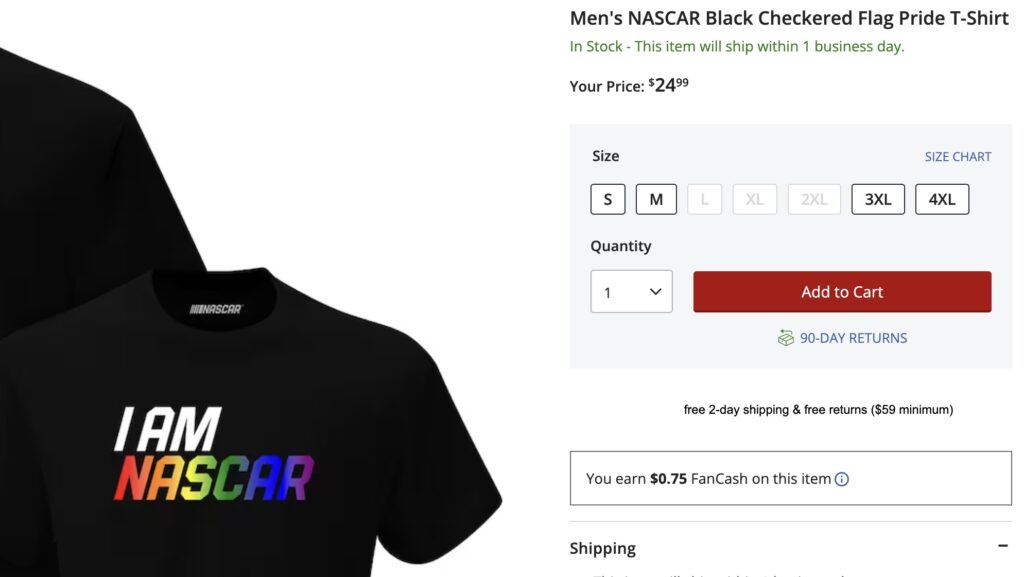
People evolve.
Now you can smoke pot in half of the country rather than going to fucking prison.
People evolve.
Acknowledging progress doesn’t mean we should stop. And being gloomy doesn’t make you a better person. In 1958, 4% of Americans approved of interracial marriage. Now Gallup doesn’t even ask anymore. The last time they did, in 2013, it was 87%. In 2021, major U.S. companies added over 323,000 jobs, with 94% of these positions filled by people of color. Among the 88 companies, employing a total of 9 million people, 74 experienced an increase in workers of color from 2020 to 2021. White workers represented only 6% of the new hires (about 20,524 jobs), while people of color filled approximately 300,000 jobs. The highest proportion of these hires were Hispanic individuals at 40%, with Black and Asian individuals following at 23% and 22%, respectively.
People evolve.
But, despite this evolution, there is a recurrent theme on the far left that things have never been worse. This progressive allergy to acknowledging advancement is self-defeating and undermines the real progress that has been made. It risks ignoring the significant strides in areas like diversity and inclusion, potentially demotivating those who have worked towards these improvements and alienating potential allies who might be encouraged by seeing positive change.
Progress and the hope that we can achieve it is the product we’re selling. A warped reality leads to policies and decisions that are warped and may hinder the very progress we aim to achieve, like singing two national anthems.
I worked in the construction industry before I moved to Denmark, and every conversation I would have with an immigrant worker always ended at the same point: “You have no idea.” And they were right. It wasn’t until my neighbor here in Denmark took in a Ukrainian refugee that it hit me. That person fled their home, fled their possessions, out of fear of actual death. Are things broken currently in the U.S.? Yes. Could the current social state be improved? Unequivocally, yes. But it doesn’t mean it’s not better than it once was. And while a warped reality can be harmful to further progression, so too can a romanticized version of the past.
On the other side, it is that over-romanticization that renders the far right to see that the progress being made means there is no need for more advancement. It is this fantasy world that makes it impossible for people on the far right to realize the country’s problems. It is how we got the 2013 Supreme Court ruling gutting the Voting Rights Act. The Supreme Court thought the South was ready for the honor system. Turns out, it wasn’t.
Restricting voting rights, believe it or not, is the single greatest threat to the American citizen. In many ways, the U.S. has worked to improve and enhance the ease with which Americans vote, with early voting and mail-in ballots. Simultaneously, there are states that are actively trying to suppress certain votes, mainly those of minority and marginalized groups. Far fewer hurdles are needed to jump for the white-collar worker to vote around their schedule. However, for the single mother of two working around daycare and two jobs, not so much. And the voter ID laws passed thanks to the removal of key provisions in the Civil Rights Act? Well, they seemed to be defended by protecting the country from fraud so rare as to be statistically nonexistent.
The real problem, in my opinion, is that neither side seems to like America very much. The rhetoric and behavior of leaders and lawmakers beg the question: if you don’t like America, then what the hell are you fighting for?
Loving America
There’s a recurring tendency in American debates for the moderator to ask each candidate, “Can you say one nice thing about your opponent?” I mean, what a stupid question. What I would like to ask each candidate is, “Can you say one nice thing about America?” Let’s be real for a minute. What do Republicans like about America? It’s not democracy. Kicking the doors in on the Capitol is far and away more disrespectful than any knee taken by a football player. It’s not the military. Trump mocked a war hero. Not too far for Republicans. I believe he said, “You fucking generals. Why can’t you be like the German generals?” We won that one, by the way. It’s not the Constitution. Lauren Boebert said, “I’m tired of this separation of church and state junk that’s not in the Constitution.” Except that it is, Lauren.
Republicans see the U.S. as morally superior to the rest of the world. And it’s that moral superiority that they feel they must protect at all costs. That’s called nationalism. It is absolutely not called patriotism. George Washington, in his famous Farewell Address, warned us “to guard against the impostures of pretended patriotism.” Patriotism, while deeply personal, is a dialogue with your fellow citizens about not only what you love about your country but what also can be improved. It is about acknowledging the flaws and challenges within a nation and working collaboratively towards betterment. It’s about celebrating the country’s achievements while also striving to rectify its wrongs. True patriotism involves a balance of pride and humility, recognizing that no country is perfect, and every nation has room for growth and change. It’s about loving your country enough to be honest about its shortcomings and committed to its continuous improvement.
Liberals see America as something that started bad and will always be bad. Unable to change. But we have changed, a lot. Representative Jamaal Bowman said, “I believe our current state of capitalism is slavery by another name.” But it’s not! It’s the thing that’s given more people more prosperity than any other system in the history of the world. Flawed though it is. It has enabled innovation, economic growth, and a level of personal freedom that many other systems fail to provide. While it’s true that the United States has a complex and often troubled history that includes issues of both inequality and injustice, it’s also a nation that has shown a capacity for growth and change.
The narrative that America is unchangeably flawed overlooks the progress made in areas like civil rights, gender equality, and social justice. This progress, though imperfect and incomplete, reflects the dynamic nature of American society. Capitalism, for all its faults, has played a role in creating opportunities and raising living standards. The challenge lies in addressing its excesses and ensuring that its benefits are more equitably distributed. Not saying that it is slavery adjacent.
This blindness with which we follow the religion of political ideology does two things. First, it stifles constructive dialogue and problem-solving. It encourages a tribal mentality, where the primary goal becomes defending one’s own group and defeating the other, rather than working together to find solutions that benefit the broader community. Second, it discourages proper dissent. Dissent that has changed this country for the better. Dissent that, in the face of overwhelming adversity, paved the way for social progress.
In 1954, during the height of the Red Scare, President Dwight D. Eisenhower said, “Here in America we are descended in blood and spirit from revolutionaries and rebels – men and women who dared to dissent from accepted doctrine. As their heirs, may we never confuse honest dissent with disloyal subversion.”
In 1896, in the Supreme Court case Plessy v. Ferguson, all but one justice voted to uphold legalized segregation; the so-called separate but equal doctrine. Justice John Marshall Harlan wrote in his dissent: “Our Constitution is color-blind, and neither knows nor tolerates classes among citizens. In respect to civil rights, all citizens are equal before the law. The humblest is the peer of the most powerful.” More than a half-century later, that humanity would be validated in Brown v. Board of Education.
The United States is one nation. And rather than two groups that don’t really like America, we should return our focus to loving our country, embracing our shared values, and finding common ground. This means recognizing and celebrating the diversity of experiences and perspectives that make up the American tapestry. It’s about fostering a sense of unity and national identity that transcends political divisions, while still respecting and valuing individual beliefs and opinions.
Loving America involves working towards a more inclusive, equitable, and just society. It means engaging in constructive dialogue, where different viewpoints are heard and considered, and solutions are sought that consider the well-being of all citizens. It’s about prioritizing the common good, understanding that what benefits the nation as a whole ultimately benefits its individual members.
It also involves acknowledging the country’s history — both its triumphs and its failures — and using this knowledge to guide future actions. Loving America means striving to uphold and embody the ideals of democracy, freedom, and opportunity that are at the core of the American ethos.
It’s about everyone coming together and singing one national anthem, whatever it may be, hand over heart and completely out of tune.

